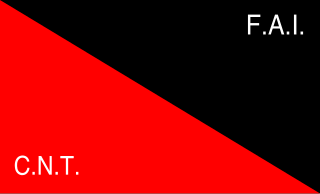Related Research Articles
Anarcho-syndicalism is a political philosophy and anarchist school of thought that views revolutionary industrial unionism or syndicalism as a method for workers in capitalist society to gain control of an economy and thus control influence in broader society. The end goal of syndicalism is to abolish the wage system, regarding it as wage slavery. Anarcho-syndicalist theory therefore generally focuses on the labour movement.
CNT may refer to:
A national trade union center is a federation or confederation of trade unions in a single country. Nearly every country in the world has a national trade union center, and many have more than one. When there is more than one national center, it is often because of ideological differences—in some cases long-standing historic differences. In some regions, such as the Nordic countries, different centers exist on a sectoral basis, for example for blue collar workers and professionals.
The International Workers' Association – Asociación Internacional de los Trabajadores (IWA–AIT) is an international federation of anarcho-syndicalist labor unions and initiatives.
The General Confederation of Labor is a Spanish trade union federation.
Anarchism in Spain has historically gained much support and influence, especially before Francisco Franco's victory in the Spanish Civil War of 1936–1939, when it played an active political role and is considered the end of the golden age of classical anarchism.
The May Days of 1937, sometimes also called May Events, refer to a series of clashes between 3 and 8 May 1937, when factions on the Republican side engaged each other in street battles in various parts of Catalonia, centered on the city of Barcelona, in the context of the Spanish Civil War.

The Unión General de Trabajadores is a major Spanish trade union, historically affiliated with the Spanish Socialist Workers' Party (PSOE).

The CNT-F or National Confederation of Labour is a French anarcho-syndicalist union.

The Spanish Syndical Organization, popularly known in Spain as the Sindicato Vertical, was the sole legal trade union for most of the Francoist dictatorship. A public-law entity created in 1940, the vertically-structured OSE was a core part of the project for frameworking the Economy and the State in Francoist Spain, following the trend of the new type of "harmonicist" and corporatist understanding of labour relations vouching for worker–employer collaboration developed in totalitarian regimes such as those of Nazi Germany and Fascist Italy in the first half of the 20th century. Up until the early 1950s, it internally worked—at least on a rhetorical basis—according to the discourse of national syndicalism. Previous unions, like the anarchist CNT and the socialist UGT, were outlawed and driven underground, and joining the OSE was mandatory for all employed citizens. It was disbanded in 1977.

The National Confederation of Senegalese Workers (CNTS) is a national trade union center in Senegal, It was founded in 1969 and has a membership of 60,000.

Revolutionary Catalonia was the part of Catalonia controlled by various anarchist, communist, and socialist trade unions, parties, and militias of the Spanish Civil War period. Although the Generalitat of Catalonia was nominally in power, the trade unions were de facto in command of most of the economy and military forces, which includes the Confederación Nacional del Trabajo which was the dominant labor union at the time and the closely associated Federación Anarquista Ibérica. The Unión General de Trabajadores, the POUM and the Unified Socialist Party of Catalonia were also prominent.

The Confederación Nacional del Trabajo is a Spanish confederation of anarcho-syndicalist labour unions, which was long affiliated with the International Workers' Association (AIT). When working with the latter group it was also known as CNT-AIT. Historically, the CNT has also been affiliated with the Federación Anarquista Ibérica ; thus, it has also been referred to as the CNT-FAI. Throughout its history, it has played a major role in the Spanish labor movement.
José D'Elía was a Uruguayan labor leader and politician.
The Charter of Amiens was adopted at the 9th Congress of the Confédération générale du travail (CGT) French trade-union, which took place in Amiens in October 1906. Its main proposal was the separation between the union movement and the political parties. The CGT was then dominated by anarcho-syndicalists who preferred the constitution of an alternate system through the elaboration of workers' union rather than moderate reforms through the electoral path. The motion for the Charter was drafted by Victor Griffuelhes, general secretary of the CGT, and Émile Pouget. The Charter was adopted by 830 participants, 8 having voted "no" and 1 abstained, and marked the victory of the current of revolutionary syndicalism in the CGT of the time.
Trade unionism is a powerful force in the politics, economy, and culture of Senegal, and was one of the earliest trades union movements to form in Francophone West Africa.
see alsoHuman rights in Colombia

Juan López Sanchez was a Spanish construction worker, anarchist and member of the Confederación Nacional del Trabajo, and one of the founders of the Federación Sindicalista Libertaria. During the Spanish Civil War (1936–39) he was Minister of Commerce under Francisco Largo Caballero. After the war he spent several years in exile before returning to Spain where he lived without persecution and participated in the "vertical" trade union movement authorized by the dictatorship of General Francisco Franco.
Enrique Pastorino was a Uruguayan trade union leader and communist politician.
References
- ICTUR; et al., eds. (2005). Trade Unions of the World (6th ed.). London, UK: John Harper Publishing. ISBN 0-9543811-5-7.
| This article related to a South American trade union is a stub. You can help Wikipedia by expanding it. |